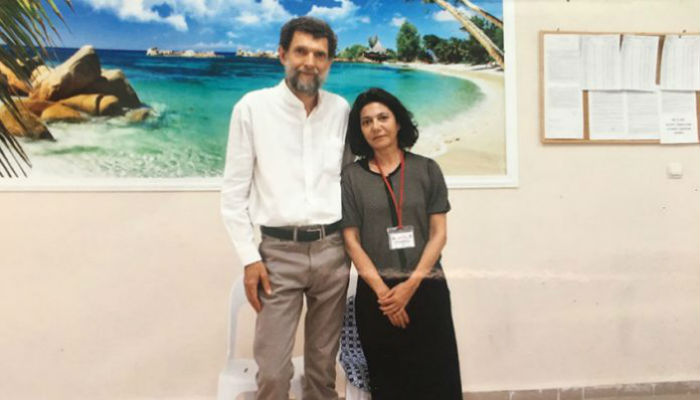Professor Ayşe Buğra, the wife of jailed businessman and rights activist Osman Kavala, has criticized the Council of Europe (CoE) for its inaction in her husband’s case amid Turkey’s refusal to enforce the rulings of the European Court of Human Rights (ECtHR) in favor of Kavala, saying that it erodes the court’s credibility.
Buğra spoke to journalist Cansu Çamlıbel in an interview for the T24 news website, discussing the case of Kavala, who has been imprisoned since November 2017 on charges related to the 2013 anti-government Gezi Park protests.
Kavala was sentenced to life in prison in 2022 for allegedly attempting to overthrow the government of then-prime minister and current president Recep Tayyip Erdoğan. His conviction, seen by some as politically motivated, was upheld by the Supreme Court of Appeals in September 2023.
Turkey has refused to release Kavala despite a 2019 ECtHR ruling that found his detention was in pursuance of an “ulterior motive,” that of silencing him as a human rights defender.
The non-implementation of the rulings prompted the CoE’s Committee of Ministers to launch an infringement procedure against Turkey in February 2022 that is still ongoing.
Buğra told T24 that the effort to avoid imposing sanctions on Turkey, which would normally be applied to a CoE member state for failing to comply with ECtHR decisions, undermines the court’s credibility.
“It undermines the credibility of the institution and the trust in the principles it is built upon. … I believe these processes are not free from political considerations,” Buğra added.
When asked if she thought the ECtHR and the CoE were delaying the sanctions they should have imposed due to political concerns, Buğra said they want international relations to “continue smoothly and positively.”
Buğra said that no one, including herself, wants Turkey to be expelled from the CoE. However, she mentioned that there are other steps that could be taken and sanctions that could be imposed before reaching that point, and she expressed disappointment that these have not been considered.
“I am upset both about our own situation and because I believe the system has been damaged. I think the ECtHR system and the CoE have been harmed by this helplessness,” she said.
In response to whether the Kavala case is a personal matter for Erdoğan, she said, “I honestly don’t know. Anything is possible. They may have thought that criminalizing the Gezi protests was necessary and that they had found a good strategy.”
She also suggested that another possible reason for Kavala being targeted could be that within the government, there was a faction wanting to sever ties with the European Union and push Turkey away from democracy and the rule of law, and that they might have viewed such an arrest as a means to furthering that goal.
When asked about Ayşe Barım, the well-known celebrity manager recently detained on the accusation of “attempting to overthrow the Turkish Republic or prevent it from fulfilling its duties” as one of the alleged “organizers” of the Gezi Park protests, Buğra said she didn’t know her and had never heard her name mentioned by her husband.
Widespread silence
The professor complained of widespread silence in the society about her husband’s situation due to an environment of fear, citing the Turkish Industrialists and Businessmen’s Association (TÜSİAD) as one of the silent groups.
Buğra said the members of the association were “afraid” to speak out.
“Especially when considering the situation we’re in, I don’t think anyone can act very courageously in such an environment today. Occasionally, they say a few things, but generally, everyone stays silent. It’s not just TÜSİAD, but also cultural and art organizations,” she added.
Buğra also spoke about the book “Bir Dava Hikayesi: Osman Kavala’nın Yedi Yılı” (A Trial Story: Seven Years of Osman Kavala), which she co-authored with Asena Günal, the coordinator of Anadolu Kültür Foundation, an organization co-founded and chaired by Kavala.
She said the book, which tells the story of Osman Kavala’s legal proceedings, was an effort to state the truth about Kavala, who was targeted by the media with publications that attacked his character and portrayed him as “Turkey’s darkest man.”
When asked whether Kavala was concerned about being perceived by a part of society as a “dark figure,” his wife recalled a statement included in the book in which Kavala said, “My reality has been distorted.”
“It’s impossible for him not to feel this. And that’s a heavy burden. … People who read the book will probably know the truth. But still, I found this statement quite significant,” she said.
A leading figure in Turkey’s civil society, the 67-year-old Kavala was born in Paris, educated in the UK and ran a cultural center before being thrust to prominence. He was accused of financing the Gezi Park protests against Erdoğan’s government in 2013.
The Gezi Park protests began in the summer of 2013 as a reaction to government plans to demolish a park in central İstanbul but quickly escalated into widespread anti-government demonstrations. The protests were met with violent suppression, resulting in the death of 11 demonstrators due to excessive police force.
Kavala’s conviction, along with those of other defendants, has been widely criticized as politically motivated and has drawn significant international condemnation and domestic protest.


